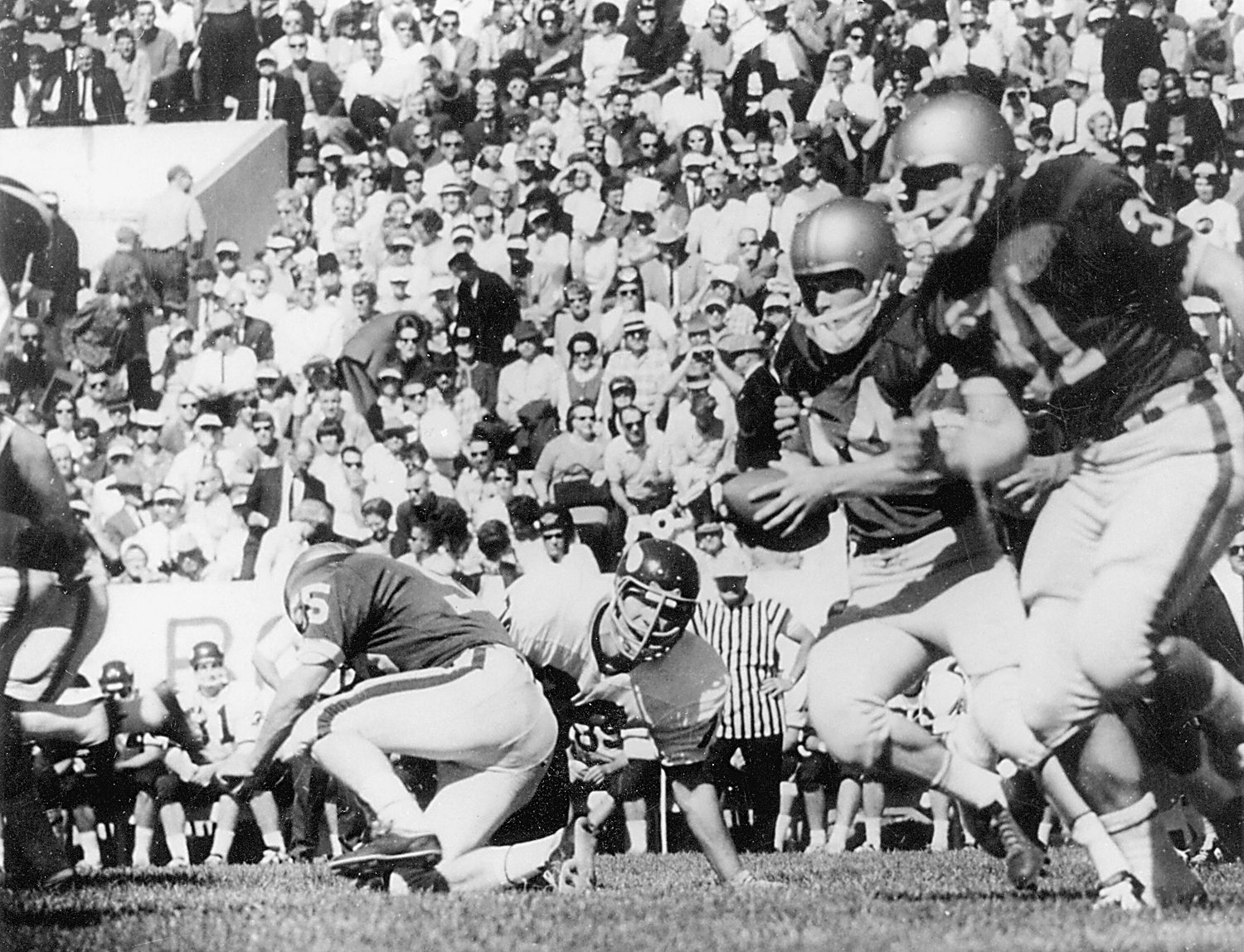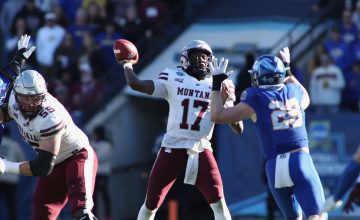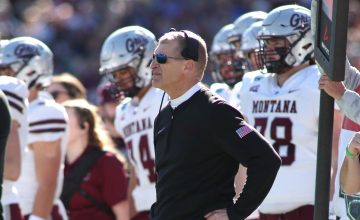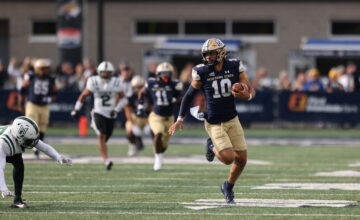Editor’s note: this story was written by Colter Nuanez for the second annual Montana Football Hall of Fame induction ceremony and originally was published in the accompanying program for the event in Billings in March. For more on Big Huddle and the Montana Football Hall of Fame, click here.
Erickson was chosen as an inductee to the National Football Foundation College Football Hall of Fame on Monday, January 7, 2018.
Dennis Erickson’s storied football career has taken him from coast to coast and everywhere in between. But the legendary coach has not found anywhere quite like the Treasure State.
From his playing days as an option quarterback for Jim Sweeney at Montana State to his start in the coaching business as the head coach at Billings Central High School, from years spent cultivating success in the Rocky Mountain West to his time winning national championships at Miami, from his West Coast stops with the Seattle Seahawks and the San Francisco 49ers in the NFL to his final college job at Utah, Erickson’s career is filled with accomplishments and fame. Yet the things he learned and the people he met during his time in Montana in the late 1960s and early 1970s still resonate with him this day.“The thing about the state of Montana is, I’ve been to every state and there’s nothing like it,” Erickson said. “I was born and raised in Washington but the state of Montana is special. Hard-working people that have fun coaching the game and believe in the game and the value of hard work. There are football coaches who are the definition of tough. I learned a lot about the way I was going to coach, how I was going to treat people, how I was going to treat players. Most of that, I got from my time in Montana.”
On March 25, the day after his 70th birthday, Erickson was inducted into the Montana Football Hall of Fame in the contributor category.
“As I look back on my career, I’ve been a lot of different places but probably the closest friends I have to this day are guys I met in the state of Montana,” Erickson said. “Everything I’ve done in my football career started at Montana State. It was the start of everything for me in my football career so this is a special one for me.”
Erickson grew up in Ferndale, Washington about 100 miles north of Seattle, the son of Robert “Pinky” Erickson, a longtime well-respected high school football coach. Erickson played his high school football at Everett High 25 miles north of Seattle while his dad was the head coach at rival Cascade High.
As a prep junior, Erickson beat out senior Mike Price for the starting quarterback job and the duo would cross paths many times throughout their careers. When Erickson was the offensive coordinator at San Jose State in 1981, he applied for the head coaching job at Weber State but Price beat him out. In 1987, the script flipped as Erickson, then the head coach at Wyoming, beat out Price for the head coaching job at Washington State. When Erickson left for the head job at Miami in 1989, he suggested Price as his replacement and Price got the job.
After two standout high school seasons, Erickson came to Bozeman to play quarterback for Sweeney, a hard-nosed Butte native who’s coaching tree also includes Sonny Holland, Sonny Lubick and Joe Tiller.
Even though Erickson “couldn’t throw worth a damn”, Tiller joked, his toughness, and competitiveness running Sweeney’s Wing-T belly option helped Montana State win Big Sky Conference championships in 1966 and 1967 under Sweeney and in 1968 under Tom Parac.
“The thing I remember about him was how tough he was and how competitive he was,” said Tiller, a former MSU offensive lineman who was a Bobcat assistant before rising through the coaching ranks, eventually spending 12 seasons as the head coach at Purdue. “A lot of times, he’d keep the ball or he’d pitch the ball as he was getting wiped out. There were times he found his way off the field at the end of a series and I thought, ‘He won’t play another down.’ And the next time we had the ball, he was out there again. He was really a tough guy.
“He was an overachiever. Theoretically, he wasn’t supposed to be able to play quarterback at the collegiate level. But he was a fierce competitor, really good football mind, understood what you were asking him to do.”
That toughness and football acumen trademarked Erickson’s career after his playing days finished. He was a graduate assistant for Parac in 1969 before taking the head coaching job at Billings Central Catholic in 1970, where he won a state championship. He returned to Montana State on Sonny Holland’s first staff, where he served as an assistant from 1971-1973.
Erickson’s ascension through the coaching business continued as he served as Idaho’s offensive coordinator on Ed Troxel’s staff in 1974 and 1975. He reunited with Sweeney for three seasons as the OC at Fresno State before taking a similar role on Jack Elway’s staff from 1979 until 1981 at San Jose State.
Erickson earned his first head coaching job at Idaho, where he cultivated his single-back offense, a scheme that would forever change college football.
“The origins of everything we do goes back to the one-back offense that I grew up in before the gun spread, the true one-back offense,” said Beau Baldwin, the head coach at Eastern Washington for nine successful years before taking over as Cal’s offensive coordinator in the off-season. “Dennis Erickson, that’s where it comes from. We’ve build off of that.”
At Idaho, Erickson helped produce some of the Big Sky’s most exciting offensive attacks, laying the ground work for quarterbacks like Jon Friesz and Doug Nussmeier to win Walter Payton Awards as the top offensive players in I-AA football.
After winning 32 games and two Big Sky titles with the Vandals, Erickson spent one year at Wyoming before taking over at Washington State. In his second season in Pullman in 1988, he led the Cougs to a 9-3 record and a No. 16 national ranking.
Meanwhile, Jimmy Johnson had taken the foundation laid by Howard Schellenberger and build the private school into a national power. From 1984 until 1988, Johnson led the Hurricanes to a 52-9 record that included three finishes in the top two of the AP final poll and the 1987 national championship.
Johnson became the apple of Jerry Jones’ eye. The powerful owner of the Dallas Cowboys plucked his former Arkansas Razorbacks teammate from South Beach to lead America’s team. At the time, Butte native Sam Jankovich was the athletic director at Miami. He handpicked Erickson to take over for Johnson despite the fact that all Erickson’s connections were in the West.
“If Sam had not been at Miami, I’m not sure Dennis would’ve ever coached the Miami Hurricanes,” Tiller said. “I don’t know how popular a hire that was at Miami at the time. You couldn’t come from further away than Washington State. But that didn’t deter Dennis. And he made them like him right away and it proved to be a great hire for both of them.”
Despite a move to the other side of the country, Erickson did not miss a beat with the Hurricanes. He led Miami to the 1989 national championship in his first season, a campaign capped by a thrilling win over No. 1 Notre Dame in the Orange Bowl to finish the regular-season and sealed by a win over No. 7 Alabama in the Sugar Bowl.
The Hurricanes were in the argument for a third straight national title in 1990 before finishing No. 3 with a 10-2 record. In 1991, Erickson and Heisman Trophy winning quarterback Geno Torretta led the Hurricanes to a perfect 12-0 record and yet another national title.
“The great thing about coaching the University of Miami was the work ethic those players had and how important it was to them,” Erickson said. “There was some great athletes, no question about that, a lot of them in the Pro Football Hall of Fame. But in general, they all played their rear ends off and had fun playing it. You can look at those ’30 for 30s’ and all that about the University of Miami — and half of it is a bunch of BS but that’s ok — but those kids enjoyed playing, they loved the game, they had a chip on their shoulder and that’s how they played.”
The impact of those Miami teams has resonated throughout college football for the last generation. From the swagger and take no prisoners attitude the players projected to the pure domination on the field, the Hurricanes have been the benchmark for college teams for nearly 30 years.
The rise and fall of Miami has been well documented and rehashed in ESPN’s ’30 for 30’ documentary series with “The U”, “The U Part II” and most recently, “Catholics and Convicts” recapping Miami’s fierce rivalry with Notre Dame.
“Those teams are remembered for more than anything winning,” Erickson said. “Once you start winning a bunch of football games and people don’t like it, all of a sudden you get people saying we celebrated to much, we did this and that. People forget at that time, when I went to Miami and before me, there was a lot of social unrest there. Ninety percent of our football team was black. They were out to prove a point. Believe me, that’s what it was about. They wanted to go on and get their education so they could help their families. People really don’t know the whole story. Those guys wanted to change the game and the world. I’ve never been around a group of football players that practiced and played harder than those guys.”
Erickson parlayed his success at Miami into his first shot in the NFL with his hometown Seattle Seahawks. He was there from 1995 until 1998, helping the team grow from a 2-14 outfit to a nine-win squad. But he did not like the lack of control provided an NFL head coach or the lack of continuity he experienced with the front office.
He returned to college, taking the head job at Oregon State. There, he took a struggling program and led them to a Fiesta Bowl win in his second season in 2000.
“We hadn’t had a winning season in like 30 years and he turned the whole program around,” said Dwan Edwards, a fellow Montana Football Hall of Fame inductee who played for Erickson at Oregon State. “He brought a credibility to him the way he ran things. He encouraged us to compete in practice and that competition led us to be so good.”
Tiller said in all the years he’s known Erickson, he’s never known his friend to turn down a challenge. So when the San Francisco 49ers offered their head coaching job to Erickson in 2003, Erickson wanted one more chance to make a run at the Super Bowl. But a lack of continuity and poor personnel management again soured Erickson on the NFL. He returned to college, making a stop for a season at Idaho in 2006 before taking his last head coaching job at Arizona State, where he spent 2007 until 2011.
Erickson’s college career ended with four seasons as an assistant at Utah, helping the Utes transition from the Mountain West to the Pac 12. At the end of the 2016 season, Utah’s associate head coach and running backs coach announced his retirement after 47 years as a college coach. But he is not completely finished.
Erickson lives in Coeur d’Alene, Idaho and his son, Bryce, is the head coach at Lake City High. Erickson will help his son this fall.
“I think I’m going to make the whole full circle,” he said. “I’m going to go from Billings Central High where I started to ending up at Lake City High coaching for my son. I think it’s kind of neat to make the circle to do the things and opportunities I’ve had, some of the successes and some of the heartaches, to now come back at the end of my career and go back and help Brice coach his high school football team, that’s what it’s all about. I’m really looking forward to that.”
Photos attribution noted. All Rights Reserved.

















